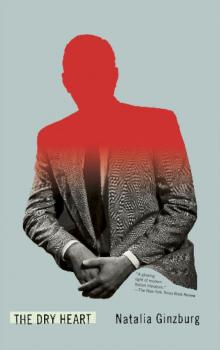- Home
- Natalia Ginzburg
Happiness, as Such
Happiness, as Such Read online
About Natalia Ginzburg
“Ginzburg never raises her voice, never strains for effect, never judges her creations. Like Chekhov, she knows how to stand back and let her characters expose their own lives, their frailties and strengths, their illusions and private griefs. The result is nearly translucent writing — writing so clear, so direct, so seemingly simple that it gives the reader the magical sense of apprehending the world for the first time.”
— Michiko Kakutani, The New York Times
“If Ferrante is a friend, Ginzburg is a mentor.”
— The Guardian
“Her prose style is deceptively simple and very complex. Its effect on the reader is both calming and thrilling — that’s not so easy to do.”
— Deborah Levy
“I’m utterly entranced by Ginzburg’s style — her mysterious directness, her salutary ability to lay things bare that never feels contrived or cold, only necessary, honest, clear.”
— Maggie Nelson
“Ginzburg gives us a new template for the female voice and an idea of what it might sound like. This voice emerges from her preoccupations and themes, whose specificity and universality she considers with a gravitas and authority that seem both familiar and entirely original.”
— Rachel Cusk
“Her sentences have great precision and clarity, and I learn a lot when I read her.”
— Zadie Smith
“Filled with shimmering, risky, darting observation.”
— Colm Tóibín
“The raw beauty of Ginzburg’s prose compels our gaze. First we look inward, with the shock of recognition inspired by all great writing, and then, inevitably, out at the shared world she evokes with such uncompromising clarity.”
—Hilma Wolitzer
“There is no one quite like Ginzburg for telling it like it is.”
—Phillip Lopate
“Ginzburg’s beautiful words have such solidity and simplicity. I read her with joy and amazement.”
—Tessa Hadley
“Her simplicity is an achievement, hard-won and remarkable, and the more welcome in a literary world where the cloak of omniscience is all too readily donned.”
—William Weaver, The New York Times
Happiness, as Such
By NATALIA GINZBURG
from New Directions
The Dry Heart
Happiness, as Such
Copyright © 1973 Arnoldo Mondadori editore, Milano
Copyright © 1995, 2001, and 2013 Giulio Einaudi Editore SpA., Torino
Translation copyright © 2019 Minna Zallman Proctor
All rights reserved. Except for brief passages quoted in a newspaper, magazine, radio, television, or website review, no part of this book may be reproduced in any form or by any means, electronic or mechanical, including photocopying and recording, or by any information storage and retrieval system, without permission in writing from the Publisher.
Originally published in Italian as Caro Michele in 1973. Published by arrangement with the Estate of Natalia Ginzburg and Giulio Einaudi Editore SpA
Manufactured in the United States of America
First published as a New Directions Paperbook (ndp1449) in 2019
Library of Congress Cataloging-in-Publication Data
Names: Ginzburg, Natalia, author. | Proctor, Minna, translator.
Title: Happiness, as Such / Natalia Ginzburg ; translated by Minna Zallman Proctor.
Other titles: Caro Michele. English
Description: New York : New Directions, 2019. | “A New Directions Book.”
Identifiers: LCCN 2019004328 | ISBN 9780811227995 (alk. paper)
Subjects: LCSH: Young men—Family relationships—Fiction. | Families—Fiction.
Classification: LCC PQ4817.I5 C313 2019 | DDC 853/.912—dc23
LC record available at https://lccn.loc.gov/2019004328
eISBN: 9780811228008
New Directions Books are published for James Laughlin
by New Directions Publishing Corporation
80 Eighth Avenue, New York 10011
Happiness, as Such
1
A woman awoke in her new house. Her name was Adriana. It was snowing out, and her birthday, she was forty-three years old. The house was in the country. The village was visible from the house, on a hilltop, two kilometers away. Fifteen kilometers to the city. Adriana had moved in ten days earlier. She pulled on a light, tobacco-brown robe. Slid her long, narrow feet into a pair of slippers that were also tobacco-brown and trimmed with dirty white fur. She headed to the kitchen and made a cup of instant coffee to dunk biscuits in. There were apple peels on the table and she swept them into a newspaper to keep for the rabbits they didn’t have yet but would soon because the milkman had promised to bring them. Then she went into the living room and pulled open the shutters. She saw herself in the mirror hanging over the sofa. She was tall, she wore her wavy copper hair cropped short, she had a small head and a long strong neck, her green eyes were wide-set and sad. She sat down at the desk to write a letter to her only son.
Dear Michele, she wrote, I’m writing primarily to tell you that your father is sick. Go visit him. He says he hasn’t seen you for days. I was there yesterday. It was the first Thursday of the month, and I was waiting for him at Canova’s Tea Shop when I got a call from his butler telling me he was ill. So I went on up. He was in bed. Seemed quite worn out. There were bags under his eyes and his skin looked awful. He has painful indigestion and isn’t eating anything. Naturally, he’s still smoking.
When you go see him, don’t bring your usual twenty-five pairs of dirty socks. The butler, I can’t remember if his name is Enrico or Federico, isn’t up to the extra burden of managing your dirty laundry right now. He’s exhausted and overwhelmed. He doesn’t sleep at night because your father keeps calling for him. And it’s the first time he’s ever been a butler. He was a mechanic before. Plus, he’s an idiot.
If you have a lot of dirty laundry, you can bring it here. I have a woman helping me, Cloti. She started five days ago. She’s not very nice. She’s always scowling and things with her are already shaky, so if you were to show up with a suitcase full of laundry to wash and iron, that would be just fine. I should remind you however that there are good laundromats near your studio and you’re old enough to take care of yourself. You’ll be twenty-two soon. Speaking of which, it’s my birthday. The twins gave me new slippers. But I’m fond of my old slippers. I also wanted to tell you that it would be a great improvement if you washed your socks and handkerchiefs at night instead of balling them up and leaving them to fester for weeks under your bed, but I’ve always told you that and the message has never gotten across.
I waited there for the doctor. He’s Dr. Povo. Maybe Covo. I didn’t quite catch his name. He lives in the building. I was unable to understand exactly what he thinks your father has. He says there’s an ulcer, which we already know about. He says your father should go to a clinic but your father won’t hear of it. I wonder if you think I should move into your father’s house to help him. I think the same thing periodically but I won’t do it. Sick people frighten me. I’m scared of other people’s diseases, though I’m not scared of my own. But I’ve never really been seriously ill. I went to Holland when my father had diverticulitis. I knew perfectly well it wasn’t diverticulitis. It was cancer. So I wasn’t there when he died, which I regret. But after a certain point in life a person has to dunk her regrets in the morning coffee, just like biscuits.
Moreover, if I were to show up there with all my bags tomorrow, I don’t know what your fathe
r would think. He’s grown shy around me in the last few years. And I’m getting shy around him. There’s nothing worse than shyness between two people who’ve hated each other. There’s nothing to say. They can be grateful that they’re not scratching and clawing at each other but that kind of gratitude hardly leads to dialogue. After we split up, your father and I started our dull but civilized routine of meeting each other for tea at Canova’s the first Thursday of every month. I never cared for it and neither did he. His cousin Lillino, the lawyer, had suggested it — he always listens to his cousin Lillino, the lawyer from Mantua. According to Lillino the two of us needed to maintain a good relationship and meet regularly to discuss common concerns. The hours spent at Canova’s have been torture for the both of us. Your father, who is methodical in his disorganization, had determined that we should remain sitting together at that table from five to seven thirty. Every so often he’d sigh loudly and look at his watch. That was humiliating, the way he stretched back in his chair and scratched at his mop of black hair. He reminds me of a tired old panther. We talked about you children. But he didn’t care about your sisters. You are his light. From the moment you came into the world he got it stuck in his head that you are the only person in the world worthy of his kindness and praise. We talked about you, even though he’s well aware I don’t understand you at all and that he is the only one who really knows you. And so that was the end of that conversation. The two of us are so worried about disagreeing that we avoid any conceivably volatile topic. You’ve always known about our afternoon meetings, but I don’t think you knew that it was his damned cousin who advised us to have them. I realize that I’m talking about it as if we were still going to be meeting. In reality, I think your father is very sick and we won’t ever meet again at Canova’s on the first Thursday of the month.
If you weren’t such a fool I’d tell you to move out of the studio and go back to Via San Sebastianello. You could be the one waking up all night instead of that butler. Realistically you don’t actually do anything. Viola is running her household. Angelica works and has the baby. The twins are in school and are still young. Not to mention the fact that your father can’t stand the twins. He can’t stand Viola or Angelica either. He can’t stand his own sisters either. Cecilia is old anyway and he and Matilde hate each other. Matilde is staying here now and will be here all winter. You’re the only person who your father loves and can stand being around. But you aren’t going to change, and I understand it’s better if you stay put, in the studio. If you went to your father’s house you’d just add to the confusion and drive the butler to despair.
Another thing I wanted to tell you. I got a letter from a person who says that her name is Mara Castorelli and that we met last year at a party at your studio. I remember the party but there were so many people that I can’t remember anyone in particular. The letter went to my old address on Via dei Villini. This woman is asking me to help her find work. She wrote me from a boardinghouse that she needs to leave because it’s too expensive. She says she has a baby that she would like to bring here so that I can meet him, this beautiful baby. I haven’t answered her yet. I used to like babies but I have no desire at all to marvel over this baby. I’m too tired. I’d like you to tell me who this girl is and what kind of work she might be looking for because she doesn’t explain it well in the letter. At first I didn’t think much about the letter but then I started to wonder if the baby is yours. Because otherwise I don’t understand why this woman would have written. Her handwriting is crazy. I asked your father if he knew about this Martorelli woman friend of yours and he said he didn’t and then he started talking about the Pastorella cheese that he likes to take with him when he goes out sailing. It’s impossible to have a reasonable conversation with your father anymore. Gradually I’ve gotten it stuck in my mind that this baby is yours. Last night after dinner I went to pull out the car — the car is always such a drag to pull out — so that I could drive up to the village to call you but you’re never home. While I was coming back I started to cry. In part I was thinking about your father who is so sick and in part I was thinking about you. If this Martorelli baby is yours, what will you do, you don’t know how to do anything. You didn’t finish school did you. I don’t think your paintings of owls and falling-down buildings are that good. Your father says they are and that I don’t understand painting. They look to me like the paintings your father did when he was young, but not as good. I don’t know. Please tell me what I should say to this Martorelli and if I need to send her money. She hasn’t asked but I’m sure that’s what she wants.
I still don’t have a telephone. I don’t know how many times I’ve gone in to petition for service but no one ever comes. Will you do me the favor of going to the telephone company too. It’s not much to ask because it’s near you. Perhaps your friend Osvaldo, who got you the studio, knows someone? The twins think that Osvaldo has a relation who works for the phone company. Can you find out if that’s true. It was nice of him to give you the studio rent free, but it’s too dark in there to paint. Maybe that’s why you keep painting owls, because you have to keep the light on all the time and it always seems like nighttime. That basement must be damp. Thank goodness I bought you a wood stove.
I doubt you’ll come over for my birthday because I don’t think you’ll have remembered it. Neither Viola nor Angelica are coming, they can’t make it, I talked to both of them on the phone yesterday. I’m pleased with this house but it is inconvenient to be so far from everyone. I thought the air out here would be good for the twins, but they’re off first thing in the morning. Off to school on their mopeds. They eat in a pizzeria in town. They go to a friend’s house to study and aren’t home until after dark. I worry until they get home because I don’t like them out on the road when it’s dark. Your Aunt Matilde arrived three days ago. She wants to visit your father but he doesn’t want to see her. They haven’t gotten along for years. I wrote and asked Matilde to come because she was at her wits end and short on money. She’d made a bad investment in Switzerland. I asked her to tutor the twins a little. But the twins keep avoiding her. I will have to be there for her but I can hardly bear being around her.
I might have been wrong to buy this house. Sometimes I think it was a mistake. They are supposed to be bringing rabbits. When they get here, I’d like for you to come and build a cage. In the meantime I was thinking I could put them in the woodshed. The twins want a horse.
The main reason for moving, I think, was that I didn’t want to keep running into Filippo. He lived so close to Via dei Villini and I ran into him all the time. It was excruciating. He’s well. His wife is having a baby next spring. Good God, why do all these babies keep coming when everyone is so fed up with them and no one wants them around. There are just too many babies.
I’ll stop here. I need to give this letter to Matilde who’s going out shopping now and I’ll stay here to watch the snow and read Pascal’s Pensées.
Your mother
The letter finished and tucked into an envelope, she went back down to the kitchen. She greeted and kissed her fourteen-year-old twins, Bebetta and Nannetta, with their identical blonde braids, identical blue jackets bearing their school insignia, and identical knee socks, who left for school on identical mopeds. She greeted and kissed her sister-in-law, Matilde, a fat mannish spinster with straight white hair, one lock always falling over her eyes so that she’d have to brush it away with a haughty gesture. There was no trace of Cloti, the maid. Matilde wanted to summon her, noting that every morning she woke up fifteen minutes later and was always complaining about her lumpy mattress. Cloti finally appeared, slinking down the hallway, wearing a sky-blue dressing gown, short and fluffy, her long grey hair loose around her shoulders. She went into the bathroom and reappeared wearing a starched brown apron. Her hair was smoothed back with barrettes. She started making the beds, tugging on the covers with enormous ennui, dramatizing with every gesture her desire to be fired. Matilde put on a Tyr
olese cape and announced that she was going on foot to do the shopping, praising the icy fresh air and snow in her deep, forceful voice. She instructed Cloti to boil several onions from the ones that were hanging in the kitchen. She had a good recipe for onion soup. Cloti answered in a weary voice that all the onions were rotten.
Adriana had gotten dressed and was now wearing tobacco-brown trousers and a beige sweater. She sat in the living room by the lit fire but she didn’t read Pascal’s Pensées. She didn’t read anything and she didn’t watch the snow out the window because suddenly she felt like she hated that snowy landscape with its shapes. Instead she put her head in her hands and then rubbed her feet and calves through the thick tobacco-brown socks and that’s where she spent the whole morning.
2
A man named Osvaldo Ventura entered a boardinghouse in Piazza Annibaliano. He was square, stocky, and wore a raincoat. His hair was grey-blond, his skin flushed pink, his eyes yellow. He tended to smile when he felt uncertain.
He’d gotten a telephone call from a girl he knew who was staying there. Someone had loaned her an apartment on Via dei Prefetti and she’d asked him for a ride.
She was waiting in the lobby, wearing a cotton turquoise shirt, eggplant-colored pants, and a black kimono with silver dragons embroidered on it. At her feet there were suitcases, shopping bags, and a baby in a plastic yellow bassinet.
“I’ve been sitting here for an hour like an idiot,” she said.
Osvaldo gathered her things and started toward the door.
“You see that curly-haired lady by the elevator?” she asked. “She was in the next room over. She was nice to me. I owe her a lot. Money as well. Smile.” Osvaldo smiled uncertainly at the curly-haired lady.
“This is my brother. He’s here to pick me up. I’m going home. I’ll bring back your thermos and everything else tomorrow,” said Mara. She gave the curly-haired lady a kiss on each cheek.

 Happiness, as Such
Happiness, as Such The Dry Heart
The Dry Heart The Manzoni Family
The Manzoni Family A Place to Live
A Place to Live All Our Yesterdays
All Our Yesterdays The Little Virtues
The Little Virtues The City and the House
The City and the House The Road To The City
The Road To The City Voices In The Evening
Voices In The Evening